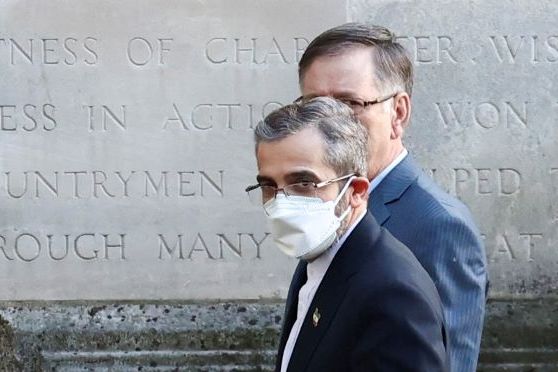Lifting Sanctions Starting Point Of Next Round Of Talks, Iran Says

Ahead of new talks with world powers in Vienna, Iran’s top nuclear negotiator has reiterated that lifting of US sanctions will be the focus of the negotiations.

Ahead of new talks with world powers in Vienna, Iran’s top nuclear negotiator has reiterated that lifting of US sanctions will be the focus of the negotiations.
“Iran has stayed in the 2015 nuclear agreement, Joint Comprehensive Plan of Action (JCPOA), and complied with its commitments under the deal," Ali Bagheri-Kani, who has been on a tour of European capitals this week, told the official news agency IRNA in London Thursday evening. "So, the first and foremost issue, which should be raised, is the removal of the US illegal sanctions on Iran."
In interviews with The Guardian and CNN's Christine Amanpour Thursday, Iran's top negotiator insisted that the US should lift its sanctions before Tehran returns to full compliance and offer guarantees that it would not leave a renewed JCPOA. Discussions on lifting US sanctions "should come to some sort of conclusion before" agreement is reached in Vienna, he told Amanpour.
The Vienna talks aim at reviving the 2015 JCPOA, which limited the Iranian nuclear program and was signed by Iran with the five permanent members of the United Nations Security Council (China, France, Russia, the United Kingdom and the United States) plus Germany.
“We need verification, and this remains unresolved. It is one of the issues that remains not finalized. It is not enough for the ink to be put on the agreement,” Iran's top negotiator told the Guardian, while emphasizing that Tehran would not negotiate on its "defense capabilities" or security.
Hardliners in Iran argue that surviving US sanctions has strengthened Tehran’s position. Javan newspaper, which is affiliated with the Revolutionary Guards, recently said Iran would be returning to talks with a “full briefcase,” as it had accumulated 210kg of uranium enriched to 20 percent and 25kg enriched to 60 percent. Under the JCPOA Iran was allowed to enrich only to 3.67 percent.
Although the hardliners argue Iran has survived US sanctions, some observers in Iran and abroad say the Islamic Republic faces unsurmountable economic challenges if the restrictions are not lifted.
Iran insists that its higher enrichment does not violate the JCPOA as its steps were taken in response to the re-imposition of US sanctions. Such steps were "within the framework of the JCPOA," Bagheri-Kani told the state-run English channel Press TV Friday.
Iran has also trimmed back monitoring by the International Atomic Energy Agency (IAEA) to that required under the Nuclear Non-Proliferation Treaty. Russian Deputy Foreign Minister Sergei Ryabkov said on Thursday that Washington should effectively demonstrate its intention to revise its sanctions policy against Tehran in order to revive the JCPOA but also emphasized that the Iranian side should carry out a series of measures to make it clear to all the other parties and to the IAEA that there would be no "deviations from the parameters of the JCPOA in the nuclear field."
According to The Guardian, Bagheri-Kani said guarantees were also required from the European parties to the JCPOA that they would trade with Iran, regardless of the US position, possibly by using a blocking statute nullifying the effect of US sanctions on European firms trading with Iran. Bagheri-Kani denied that Iran had stalled the resumption of the Vienna talks to further develop its own nuclear program.
When former US president Donald Trump imposed sanction in 2018, European signatories of the JCPOA tried to keep trade alive with Iran, but fear of the sanctions dissuaded private companies from doing business with Tehran.